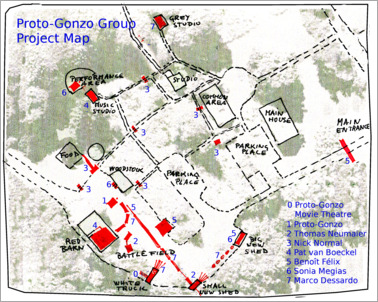"Proto-Gonzo", an exhibition hosted by I-Park Foundation and created under "Proto-Gonzo"* rules, by Benoît Félix, Sonia Megìas, Thomas Neumaier, Nick Normal, Pat van Boeckel and Marco Dessardo.
Proto-Gonzo Rules:
1. I-Park hosts a special program based on collaboration, interdisciplinarity and experiment: Proto-Gonzo. The program consists of a three-week residency in July 2011 for 6 artists (sculpture, video, sound, photo, performance, writing) whose work will be site-specific and will integrate collaboration under specific, self-determined common rules.
2. The Proto-Gonzo session is curated by Marco Dessardo.
3. Proto-Gonzo participants sculpt the space between the Kitchen Garden and the Junk Trail at I-Park. Proto-Gonzo artists consider the following as their art materials: a studio, a red barn, junk, boulders, a wooden shed, paths, earth, doors, wood, land, the Proto-Gonzo artworks and the Proto-Gonzo artists. Additional materials can be purchased.
4. The invited artists of Proto-Gonzo and the curator discuss together and accept in advance common rules as the basis for the collaboration.
5. The rules of Proto-Gonzo are part of the artwork.
6. The participating artists for Proto-Gonzo are selected based on the specificity of their propositions.
7. The application deadline for the Proto-Gonzo session is February 28, 2011.
8. The Proto-Gonzo session runs from July 13 to August 1, 2011.
9. Proto-Gonzo artists receive a grant plus reimbursement of travel costs.
10. A Proto-Gonzo catalog is self-produced by the artists and funded by I-Park.
11. The Proto-Gonzo opening ceremony on July 30 is organized on site by the artists.
12. The application for Proto-Gonzo requires acceptance of the Proto-Gonzo rules.
* gonzo: slang, Communication Arts/Journalism & Publishing of journalism explicitly including the writer's feelings at the time of witnessing the events or undergoing the experiences written about
Map of the Proto-Gonzo Battlefield exhibition:

Proto-Gonzo by Thomas Neumaier:
We don't know, where we are, but we are
In a society, where are all parts are subjugated by the rules and function of the economy,
we prefer
to be useless
to be outside of function
to be outside of systems (or to go into new systems)
In public spaces we prefer to be private.
In private spaces we prefer to be public.
Sometimes we prefer in private rooms to be more private or
in public rooms to be more public.
To good questions, we need no answers.
Sometimes we are responding and there are no questions.
Our logic is absurdity.
We look outside to look inside.
We look inside to look outside.
Sometimes we make rules to break rules.
We use the privilege to be outside of function.
We don't know, where we are, but we are.
50 x 100 x 100 m, wood, stones, water, and multiple materials

























































